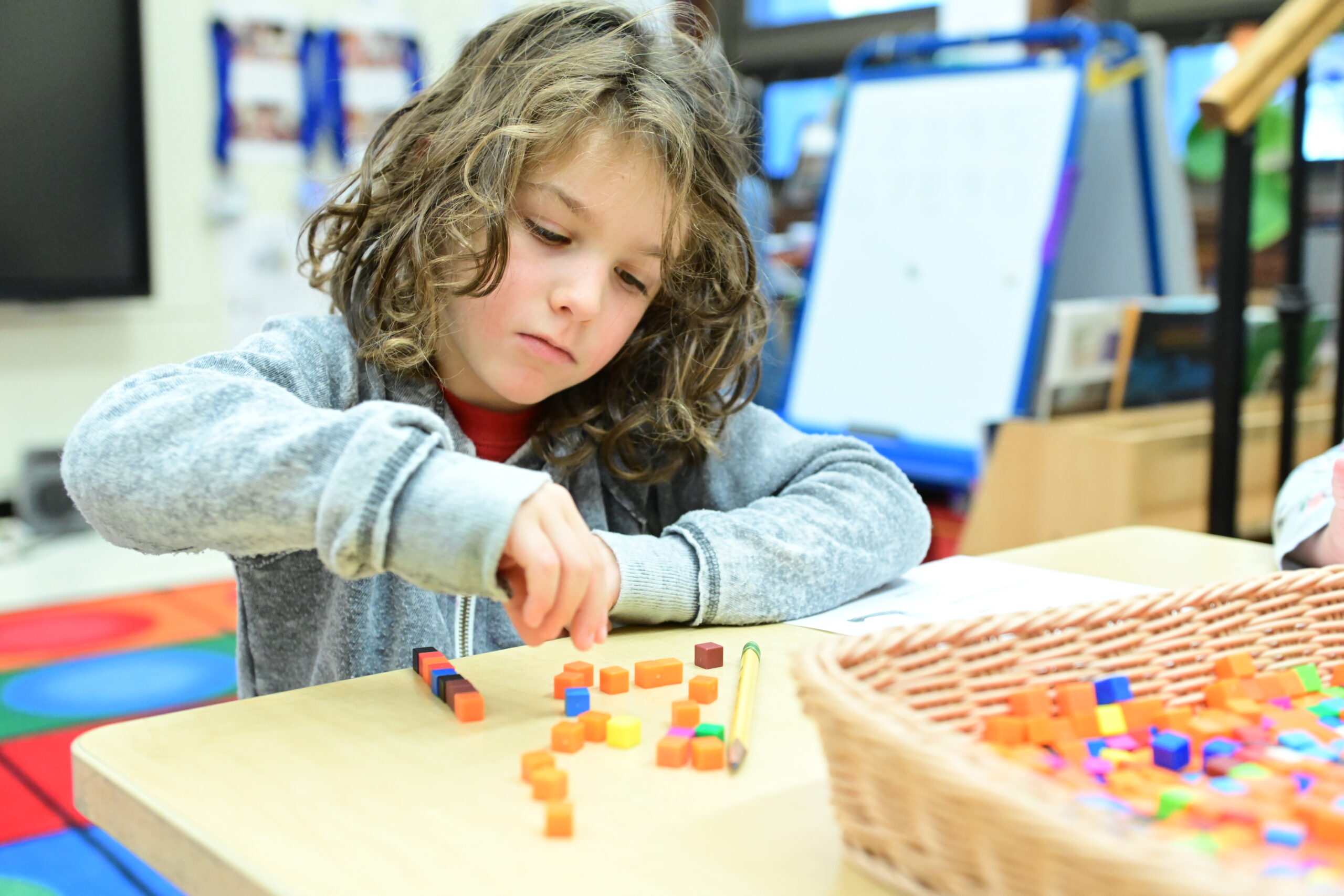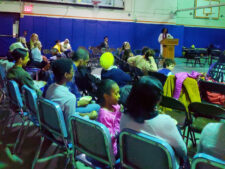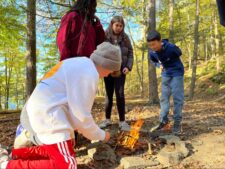This story was originally published in the May 2024 edition of the ECFS Reporter.
ECFS prepares our students to be serious lifelong learners.
Progressive education at ECFS extends the definition of “learning” beyond traditional limits. Our teachers adopt a dynamic, creative, and student-centered approach, empowering students with the skills to excel academically and emerge as leaders.
Our comprehensive and interdisciplinary curriculum integrates the humanities, the sciences, the arts, and physical education to cultivate intellectual rigor, academic mastery, and innovative thinking. Our commitment to building skills and strengthening academic excellence defines ECFS’s progressive education and creates confident individuals who approach challenges with curiosity and resilience.
Igniting Curiosity
Responsive teaching methods allow students to take ownership of their educational experiences.
At ECFS, teachers employ a responsive approach to education — curricula are never rigid templates but rather dynamic pathways that can flex to accommodate to each student’s needs and curiosity. Students are taught to investigate and inquire about the world by exploring and connecting global events, shared cultural experiences, or personal interests. This holistic approach is seamlessly integrated across all grade levels and subjects and nurtures a community of passionate lifelong learners and leaders.
In the vibrant landscape of education, focus has recently shifted to STEAM (science, technology, engineering, arts, and mathematics) programming. As interest grows among students, ECFS’s teachers are growing current STEAM initiatives and forging new pathways for exploration. Often, the programming at Ethical Culture and Fieldston Lower leverages the abundant outdoor spaces that students have access to: Central Park and the sprawling Fieldston campus.

Ethical Culture Science Teacher Beverly Chang’s 1st Graders engage with a cherished tradition that unfolds like clockwork each fall: the beloved “Central Park Study,” a rich, interdisciplinary experience that engages all five senses. Guided by Chang, the young learners venture into the park and transform into budding biologists. With magnifying glasses in hand, the 1st Graders explore every inch of the ground as they meticulously inspect plant life, rocks, insects, mammals, and other critters that call Central Park home. This outdoor exploration allows students to cultivate the fundamental knowledge of how to learn and observe that will evolve into formal scientific thinking, methodologies, and habits.
Prioritizing responsive teaching encourages faculty members to design lessons with autonomy and ambition in mind. This year, a group of Chang’s students was especially curious about the anatomy of worms and how to distinguish them from insects, so Chang tailored a lesson that engaged their inquisitive minds.
Inspired by their discoveries, the students learn to conduct fair tests to answer inquiries such as “Do worms prefer the rain or sun?” To investigate, they devised an experiment by dampening one side of a tray and placing it in the shade while keeping the other side dry. Then they observed the worm’s behavior and wrote down what they noticed before heading back to the classroom to pour their findings into a booklet that they could use to educate their peers and families. “It’s not about the specific subject matter itself, but the skills and processes they develop along the way,” Chang explains.
No matter what students latch onto, Chang can guide them to ask questions and think independently, enabling them to seek solutions creatively. “I encourage all my students to pursue their interests, no matter what piques their curiosity. What matters most at this stage of academic skill development is learning the practice of scientific thinking and the scientific engineering process where they identify problems, brainstorm solutions, design, test, and redesign,” Chang says.

Responsive teaching ensures that our curriculum is academically relevant and stimulating. At the beginning of the academic year, Fieldston Lower Principal Joe McCauley initiated a student garden club in response to a letter from a group of 5th Graders advocating for increased meaningful garden time, and after a presentation by the 5th Grade Garden Club student leaders, 3rd Grade Teacher Chris Lally was inspired.
Lally began his career in the food industry and worked in restaurants worldwide for over 20 years. After culinary school and training in New York, he later joined the Rome Sustainable Food Project at the American Academy in Rome, where he gained insights into the connections between farmers, chefs, and communities. Once Lally discovered his passion for educating young people and joined Fieldston Lower, he created and piloted the garden curriculum with his students to share some of the ethical principles he’d learned about food sources.
I’m turning my passion for STEAM into a tangible reality and paving the way for future generations of aspiring engineers at ECFS.
Once the frost had melted, Lally and Head Teacher Gio Casiano regularly brought their 3rd Grade students to the garden, where they added soil to pots; prepared seeds; and studied the areas in the garden with the most suitable temperature, access to water, and drainage for their seeds to grow. “Throughout the spring, students plant and tend the garden; forage and prepare tisanes; harvest and wash vegetables; write menus; and build, plate, and serve salads for themselves and their peers,” explains Lally. “Our students are getting their hands dirty with the work required to care for the land and life of the garden. It has been a fascinating and rewarding addition to our classroom.” This hands-on experience deepened their understanding of farming, food sources, and the scientific makeup of plants and also taught them to become respectful caregivers and stewards of a more sustainable community.

Our students trust that their voices will be valued and actively advocate for change and new ideas. By giving students ownership of their educational experiences, their interest in learning and exploring is carried forward as they advance through Fieldston Middle and Fieldston Upper. Not only do they value the mentorship received from their teachers, but they also become mentors themselves, passing on their knowledge to the next generation.
A cohort of 10th–12th Grade Fieldston Upper students involved in engineering and robotics visited Ethical Culture’s 4th Graders to share how STEAM concepts manifest in our daily lives and inspire future generations to carry on their work. During the visit, the older students conducted workshops, including designing tinfoil boats to test buoyancy and building sturdy towers out of newspapers to explore structural engineering. These cross-divisional interactions create meaningful connections between students of different ages and model the kind of academic exploration younger grades have to look forward to.
Sophia T. ’26 remembers all the times that her curiosity was celebrated as an elementary school student: “I trace my love for engineering back to Pre-K at Ethical Culture. I remember creating ‘beautiful junk’ — turning old egg cartons and toilet paper into musical instruments and home decor,” she says. “In 1st Grade woodshop, I was introduced to tools and built a wooden tugboat, which taught me about design constraints. Once I reached 4th and 5th Grade, I took computer science, which introduced me to coding and showed me the artistic side of engineering, solidifying my interest in STEAM.”
Education is not just about imparting knowledge, but also about nurturing a spirit of inquiry, creativity, and advocacy that prepares students to lead purposeful lives. Kai KS. ’25 credits his academic career at ECFS for cultivating his love for engineering and setting him on a clear path into the future. “My journey at the School has been a testament to the transformative power of creative learning and supportive mentorship. Through innovative programs and dedicated teachers, I’m turning my passion for STEAM into a tangible reality and paving the way for future generations of aspiring engineers at ECFS.”
A Diversified Approach
A dynamic, experiential approach promotes comprehensive understanding and belonging.
At ECFS, the curriculum prioritizes engaging students’ hands, hearts, bodies, and minds. Teachers emphasize that learning occurs beyond the classroom desks and by utilizing our hands-on, project-based approach. Their goal is for students to not only perceive, listen, and think, but to also create, do, and experience.
In recent years, Fieldston Lower’s 3rd Grade teachers — Alexa Shikar, Gio Casiano, Chris Lally, and Ana Baert — along with Assistant Principal for Academic Life Shawn Chisty and the Library and Technology teams have revamped the social studies curriculum to ensure relevance and introduce meaningful educational opportunities inside and outside class. Moving away from rote learning, teachers are opting to immerse students in real-world experiences whenever possible.
A cornerstone of the newly developed social studies curriculum is the opportunity for students to explore cultural landmarks in New York City, including Arthur Avenue in the Bronx, Harlem’s Apollo Theater, and the Eldridge Street Synagogue, to gain an understanding of the value of a culturally vibrant neighborhood community.

Inspired by a program called Imaginative Inquiry, teachers incorporated dramatizations to engage students in scenarios that require critical decision-making. In one of this year’s simulations, the “mayor” (expertly played by Principal Joe McCauley) proposed a lucrative development akin to Hudson Yards, prompting students to assume roles as researchers and advocates, crafting counter-narratives to the proposal.
As they considered the proposal, students realized that adding commercial spaces would mean displacing existing residential spaces, small businesses, and significant landmarks. After reflecting on their visits to local businesses and sampling diverse cuisines like traditional Italian pizza on Arthur Avenue or pickles on the Lower East Side, they grasped the importance of preserving cultural uniqueness. “By practicing debate and research skills and building an awareness of dialectical perspectives when forming an argument, students were challenged to advocate for a place that promotes preservation and belonging — a neighborhood for the future,” explains Chisty.
When the “mayor” and “consultants” met again, students presented compelling arguments based on their experiences. They advocated for preservation, showcased the economic benefits of places like the Apollo Theater, enhanced their credibility with detailed research, and appealed to emotions by highlighting the importance of local businesses to the community.
“The project’s experientiality asks students to think in a way that an adult would have to; this helps them practice conversational skills and become sophisticated, future-oriented individuals who are self-assured in their ability to effect change,” adds Chisty.
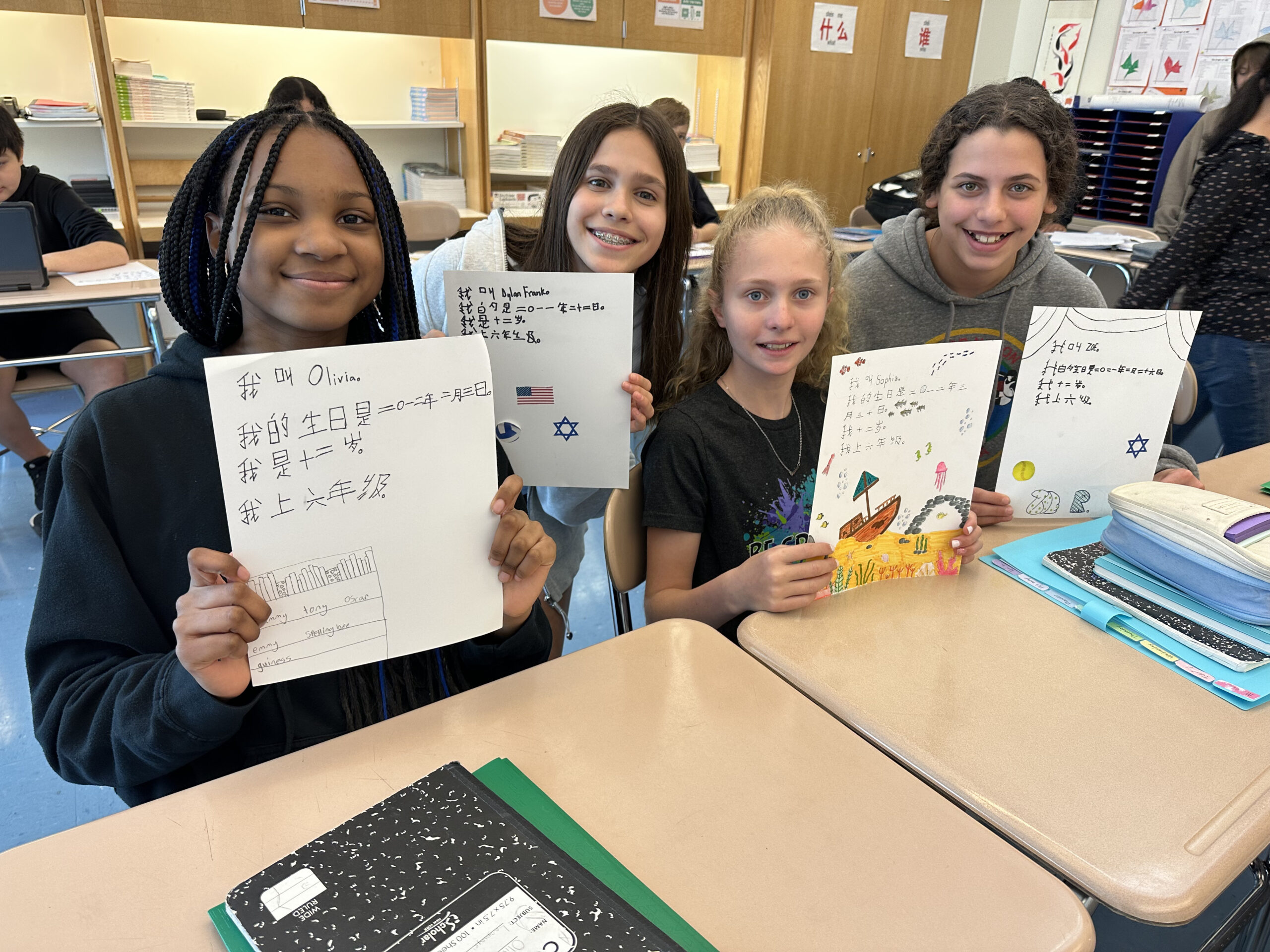
This focus on student autonomy and forward-thinking education continues at Fieldston Middle. After language teachers noticed a gap in students’ exposure to all of their options for choosing a foreign language, they decided to introduce the 6th Grade class to all four languages instead of students immediately picking just one to study all year. This year, for the first time, the 6th Grade spent each quarter immersed in one of the languages offered at the middle school level: Mandarin Chinese, French, Latin, and Spanish.
“Before choosing a language to study in middle school, the majority of the incoming 5th Grade students had only studied Spanish,” says Fieldston Middle Chinese Teacher and Language Department Chair Xiaofei Li. “Once the choice was made, most students would continue with that language throughout Fieldston Middle and Fieldston Upper. We heard students say they wished there was programming for them to experience all the languages. To respond to the students’ interests, we developed the rotation program for 6th Grade this year.”
Students are immersed in different sounds, cultures, and classroom routines and have the opportunity to make a well-informed choice about which language they want to dedicate their time to.
Throughout the year, students have developed a comprehension of each language. Along with grasping basic grammar, pronunciation, and vocabulary, they explored cultural details such as Roman mythology, Francophone heritage, Spanish-speaking communities worldwide, and Chinese holidays. “Students are starting to compare the languages by drawing similarities and differences, which develops their abstract thinking and understanding of how languages work,” Li says. “They’re also discovering that they may be good at learning a language they didn’t expect.”
“The freedom to explore all the languages and get a preview of each one is nice,” says Daniel R. ’30. “It also feels good to know that you don’t have to pick what language you’re going to study in middle school without really considering your options.”
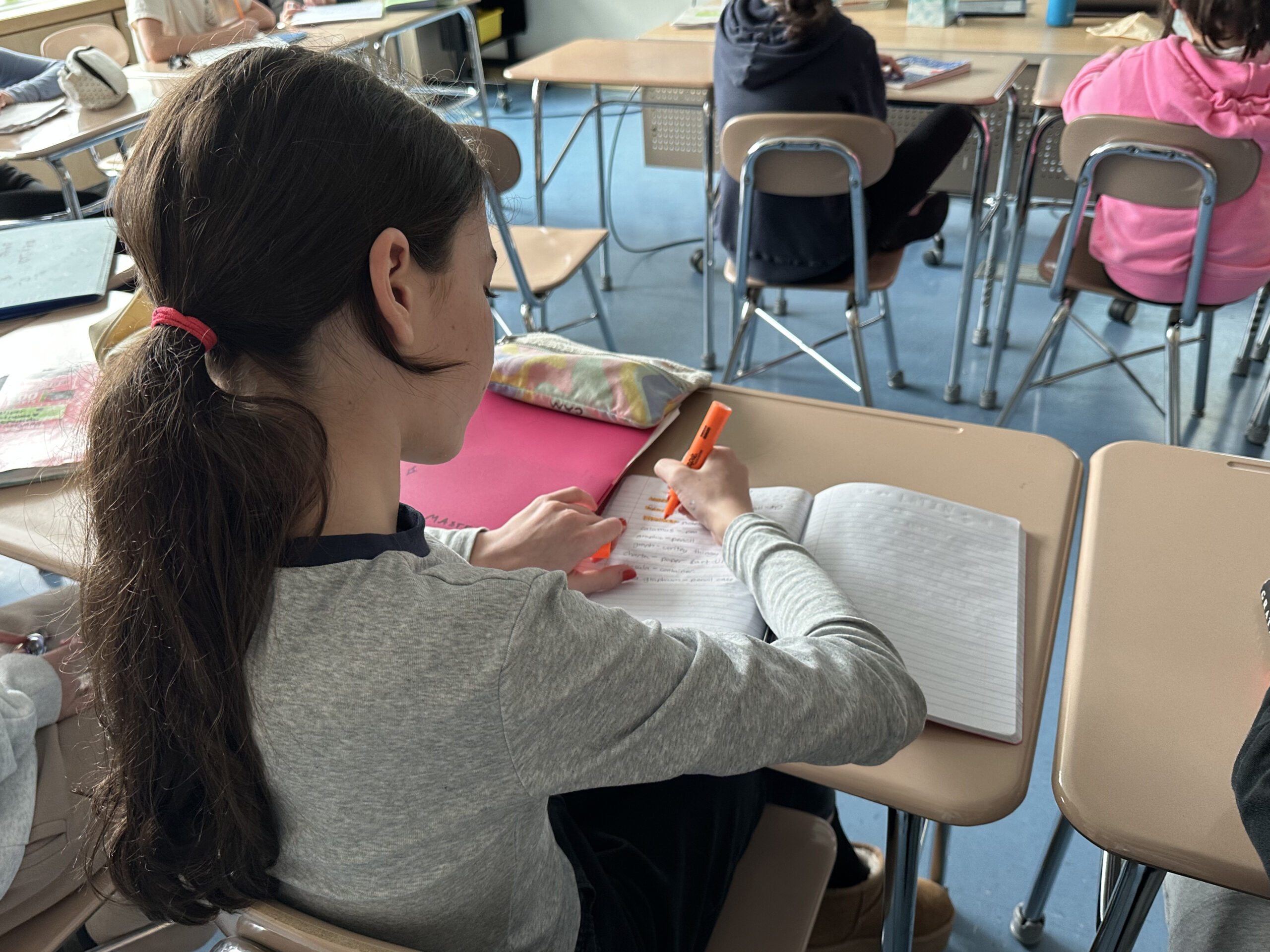
“I love the idea that students are immersed in different sounds, cultures, and classroom routines and have the opportunity to make a well-informed choice about which language they want to dedicate their time to,” says Spanish Teacher Erinn Boyle. “They will make connections between the languages and begin to understand what types of skills and habits they’ll need as they grow their proficiency in a language.”
As the first year of the rotation program concludes, it promises to continue widening Fieldston Middle students’ understanding of what they’re capable of in the classroom.
Developing Leadership Skills
Empowering students to be self-starters cultivates confidence in the classroom and beyond.
Our educational program developing students as active citizens and future leaders is integral to academic achievement. Through reflection, inquiry, critical analysis, and contextual understanding, ECFS’s goal is to provide a rigorous yet fulfilling learning journey that equips students with knowledge, theories, and practical skills they can utilize throughout their lives. Academic proficiency extends beyond having the right skills — it also requires readiness to utilize those skills.
Being an independent thinker in both individual and group settings is fundamental to the Fieldston Upper experience. With access to course electives, semester away programs, multiyear science research labs, and City Semester’s immersive study of New York City, 11th Grade students sample the kind of academic freedom that promotes confidence in both their studies and themselves.
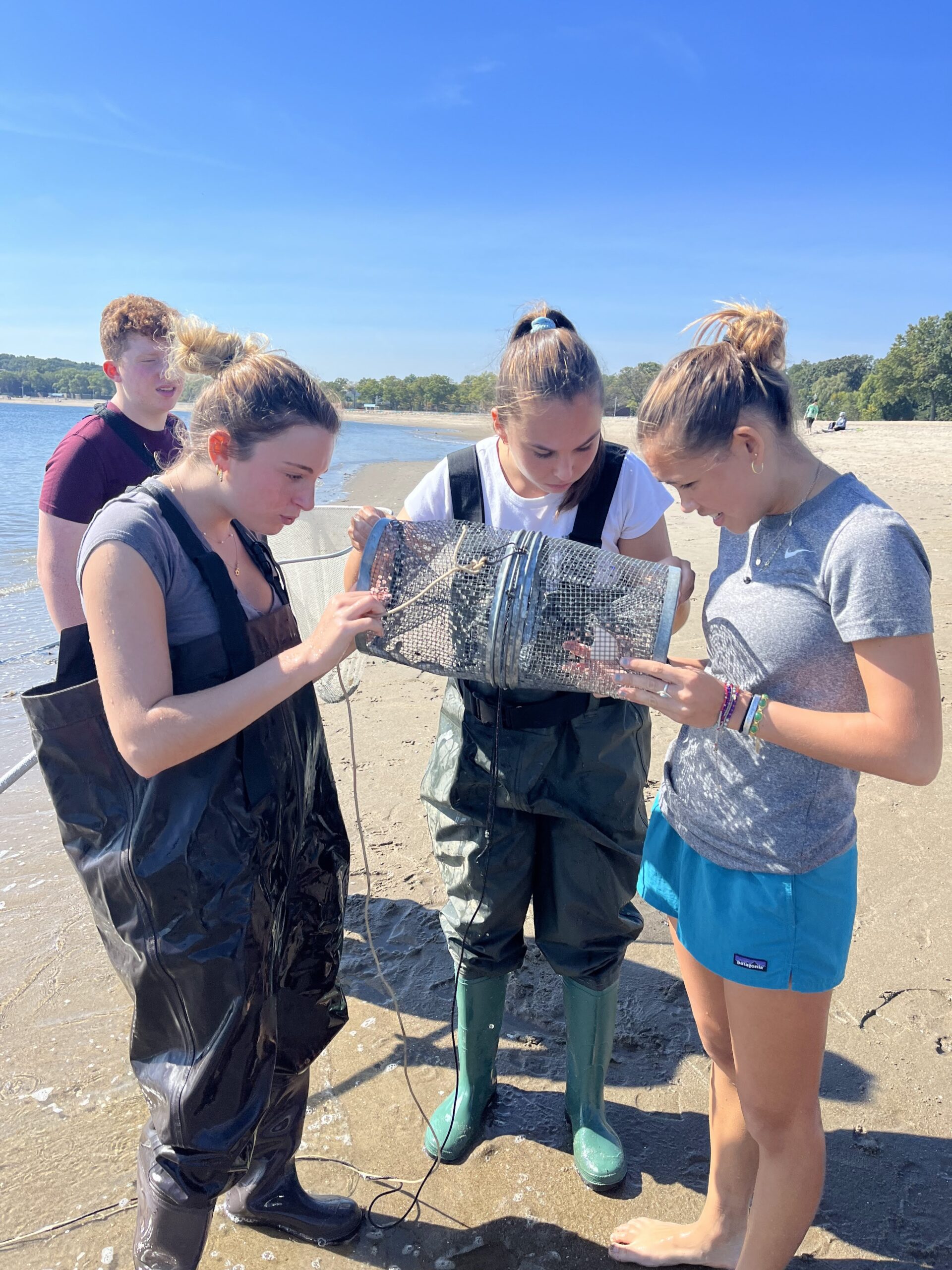
This academic freedom culminates in opportunities for 12th Graders to complete senior projects and independent studies as they prepare for their futures beyond ECFS. As they finish 11th Grade, students can propose an independent study for the following year to extend their learning outside the School’s standard curriculum. The proposal process requires students to find a faculty supervisor; consult with their advisor and dean; and submit an objective, outline, bibliography, and requirements for their potential study.
After participating in the science research program for two years, Ellie U. ’25 discovered an interest in understanding data analytically and from a scientific point of view. “Through my extracurricular activities, I became interested in learning more about business and psychology,” Ellie shares. “After talking with Mr. Waldman about my lab’s research work and my interest in business, we decided to dive into a combination of all of my interests by creating an independent study on behavioral economics.”
Ellie plans to explore different research showcasing what motivates economic behavior. “Because a main part of my work will be examining academic papers and research studies, I’ve been preparing by learning how to read academic papers and use various sources to understand how different topics connect,” she says. “Something that I love about this opportunity is how discussion-based and student-driven it is. I can guide my study with topics I’m interested in and spark new conversations.”
With recent independent study topics ranging from Hungarian history and judiciary to environmental racism in the Bronx, the breadth of students’ ideas exemplifies the creativity and cleverness they’ve honed when preparing for their college careers.
It’s about learning how to step up to the challenge, learning study habits, and developing as creators. Our time at Fieldston has given us a resourcefulness that will benefit us later in life.
“Every year, I am in awe of the intelligence, creativity, joy, ingenuity, intellectual curiosity, and autonomy that I witness from our students,” says Director of College Counseling Jameel Freeman. “Much of this is due to our progressive pedagogy and commitment to allowing students to explore and interact with the world around them freely. Particularly at Fieldston Upper, students are given the ability and responsibility to go beyond the scope of their traditional academic disciplines to discover intellectual interests that are authentically exciting and important to them. This lifelong commitment to academic exploration and ethical leadership has always been valued and pursued by the colleges and universities into which our students matriculate.”
“An independent study is almost like teaching yourself a class,” says Jake K. ’24, who compiled an overview of Hungarian history from 1945 to 1990 and intertwined his grandparents’ experience as Hungarian Holocaust survivors into his research. “It’s the first time that I’ve done independent work of this magnitude. You have to keep yourself accountable, and when you’ve learned to do that independently, it becomes much easier to do that in the classroom, too.”
Students may be inspired by classes they previously took to pursue unexpected study topics. After taking The Prison Complex: Ethical Issues in the U.S. Criminal Legal System, Greta G. ’24 recognized an opportunity to explore her own Hungarian heritage alongside it. “That class made me realize that I was interested in criminal justice and reform,” she says. “We went through the United States criminal justice system and how external factors impact it. I wanted to do something similar with the Hungarian system, and it turned into an inspection of how the legal system developed there and how the government has changed over the last couple of decades.”
Similarly, the experience Harrison S. ’24 had in a history class on American politics gave him a fresh perspective on what he felt confident in studying. “I stopped seeing history as disjointed and started seeing how it impacts our present day,” he says. “Given that we attend a nearly 150-year-old school, I realized just how much has happened on the Fieldston campus, and I wanted to compose a paper to document the School’s fragmentary past in one place.” Using the intellectual confidence he built as a City Semester student, Harrison dove into the history of the School from any angle possible: historical reports, Fieldston News stories, New York Times articles, and archival photos.

Senior projects, which allow students to design and participate in their work outside of the classroom during their final spring semester, can also lead to students honoring ECFS’s influence on their lives. As part of their project, Caroline M. ’24 and Diana B. ’24 painted a mural with three scenes capturing the joy of a sunny day on the Quad.
“Originally, we each had very different ideas about what we wanted to do,” Caroline says. “But when we talked to one another, there was this moment where we were able to perfectly combine our ideas in a unique and unexpected way.”
“There’s a feeling on campus when winter’s over, and it starts to feel like spring again,” adds Diana. “The first warm day that everybody’s back on the Quad is so joyous. For both of us, that felt like one of the moments we wanted to capture.”
Senior projects incorporate an interdisciplinary approach to explore subjects outside the regular curriculum, which sometimes means asking students to dedicate substantial time off campus to complete their work. Such a feat may initially feel daunting, but for some students, big ideas inspire vast collaboration. For their senior project, Kevin V. ’24, Amiri M. ’24, and Gavin W. ’24 produced a musical album, prompting Austin U. ’24, Justin A. ’24, and Wyatt T. ’24 to make a documentary about the creation of their friends’ album.
“The idea goes back to 6th Grade when we first met each other and were all placed in the same electronic music class,” Gavin says about the album. “That’s where we discovered our love of music, whether it was making the beats ourselves, where to place the drums, or how to put it all together.” Six years later, the group of friends knew that their love of music — from composing the music to writing the lyrics to producing the tracks — would provide a strong foundation for a senior project and be an opportunity for them to dive into their shared interest together.
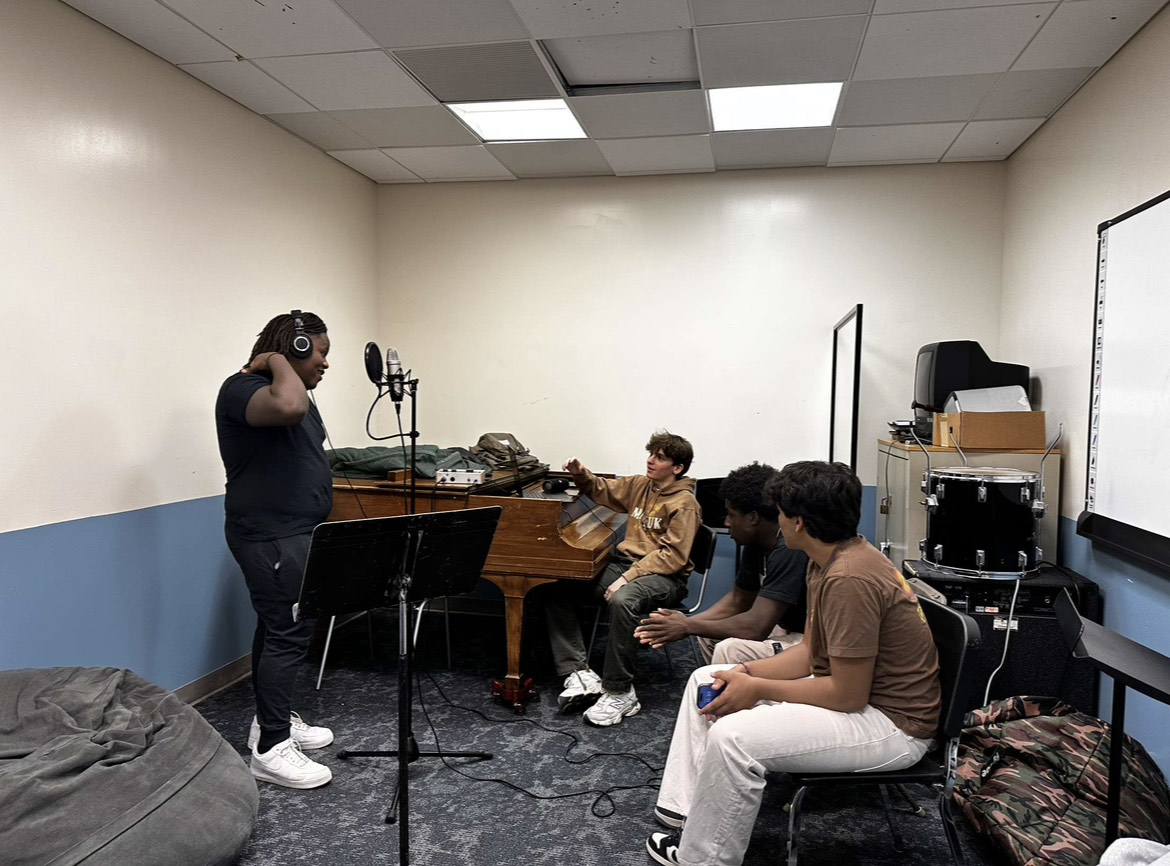
Gavin, Kevin, and Amiri interviewed their peers about their experiences at school, focusing on students of color, and used these transcripts to write song lyrics. “It’s been a really amazing process seeing my close friends put their passions to use and display their raw talents,” Justin says. “I’ve learned a lot just watching them and seeing how much they enjoy music and how serious they are about it.”
“Whether you’re on the music side or the production side, whether you’re making videos, arranging clips, organizing interviews, or writing questions, one thing we can all take away as a collective is resourcefulness,” Gavin adds, recalling advice from one of his math teachers about lessons beyond the books. “It’s about learning how to step up to the challenge, learning study habits, and developing as creators. Our time at Fieldston has given us a resourcefulness that will benefit us later in life.”
“This opportunity requires you to think independently, and that’s when you can push the boundaries of your knowledge and your creativity — and do things you didn’t think you’d be able to do,” Caroline says. “Going out on your own forces you to utilize your toolbox of skills you’ve developed over all your years as a student.”
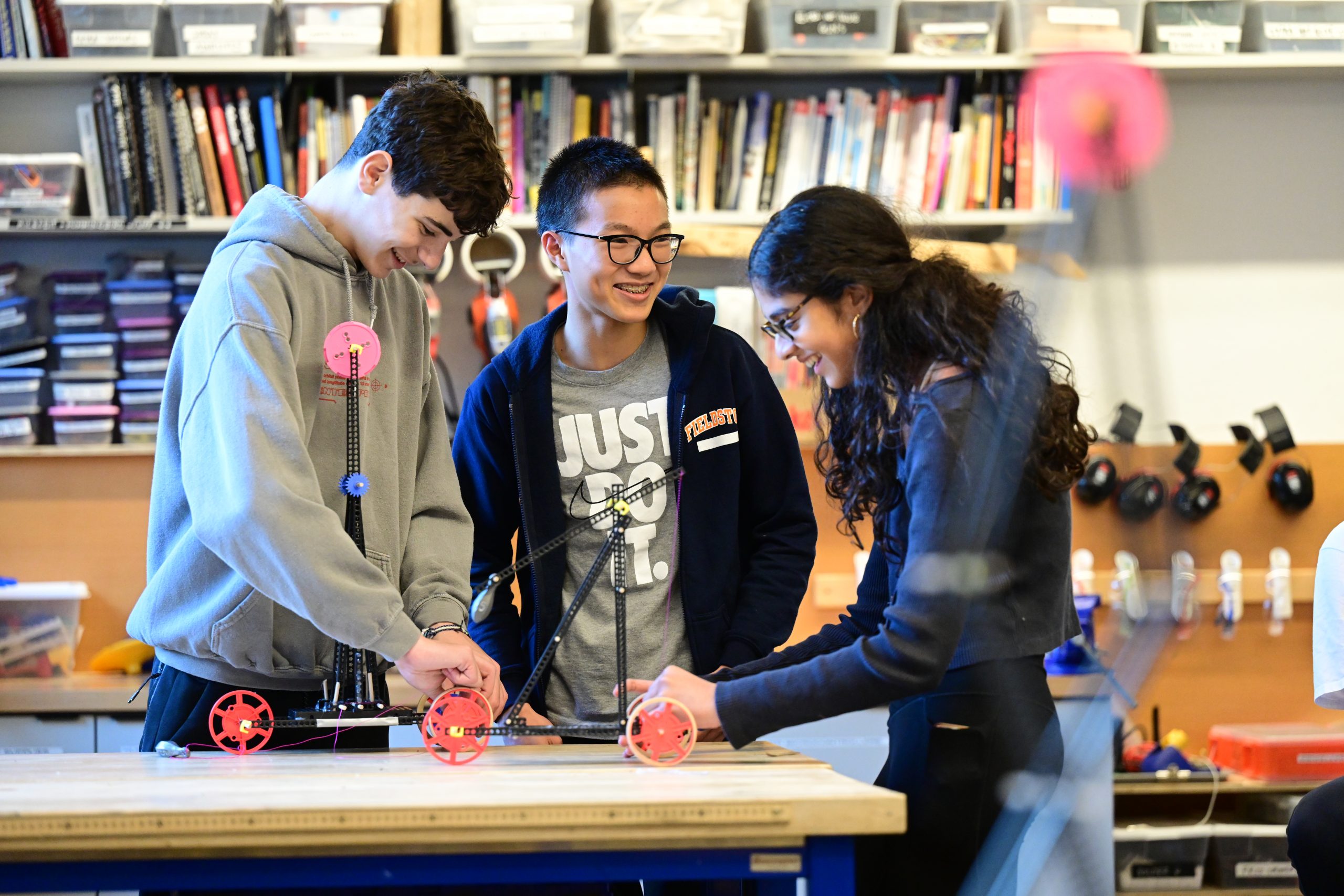
“Senior projects and independent studies empower students to enhance their own learning,” says Ethics Teacher and Class of 2024 Dean Stephanie Harris. “Students who participate in these programs are deeply curious and self-motivated to push their education in intellectually curious ways. When students are dedicated to learning about topics that matter to them or that spark their creativity, their energy and enthusiasm are palpable.”
From vibrant interdisciplinary units like the 1st Grade Central Park Study to the dynamic approach of the 6th Grade language rotation to the intellectual challenge of the 12th Grade independent studies, ECFS cultivates a community where students acquire the knowledge, curiosity, and determination to prepare them for the future. Our faculty’s dedication to an experiential education resonates not only in the information our students learn, but also in the opportunities and experiences that spark questions, nurture critical thinking, and enhance cultural understanding. This approach to teaching and learning — driven by our shared commitment to fostering academic excellence and the profound transformation that comes from immersive learning — is a hallmark of what makes an ECFS education unique and invaluable for the students of today and the leaders of tomorrow.
